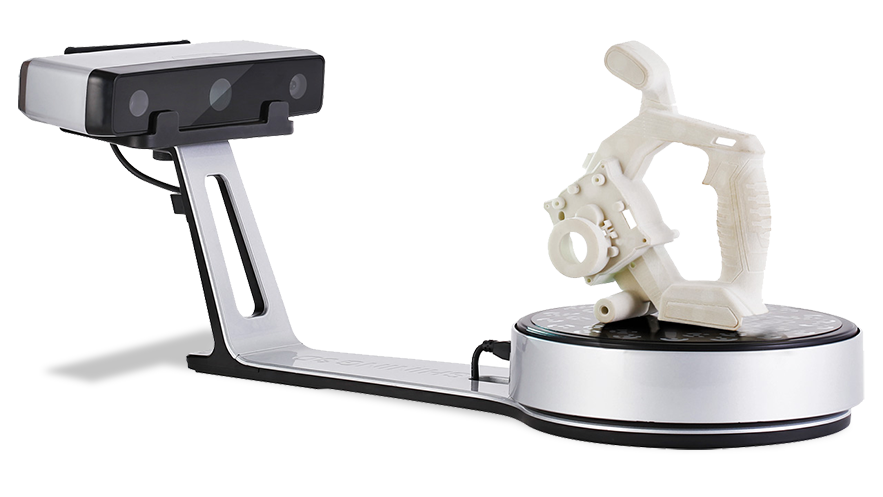We have much experience with hardware prototyping of plastic parts, metal parts and electronic parts. Electro-mechanical prototypes typically require software prototyping, which we also have much experience with.
We are confident we can deliver rapid prototyping solutions for you. The following sections outline some key phases.
Our core business is focused on projects that have a break-even point, such as resale via mass production. To learn more about this see our page on Bindi New Product Development.
Product Design Phase (Computer modeling from scratch or 3D scanning)
During this phase we assess your requirements to determine if we are best to design your model from scratch using 3D CAD tools, 3D animations tools, or perform a 3D scan an mock up model.
While 3D scanning sounds like an easy option, it is not perfect, and requires much cleaning up of the model. Further it produces a file with point cloud data, which then must be converted to a typical CAD file (e.g. .igs, .stp, and/or .stl). It is because of these reasons, it is generally quicker to create the design from scratch (unless the target requirement is just to reprint the scanned object without any additional design features - which is a service we're not keen on providing).
In terms of electronics - generally we design custom electronics to get the unit cost down, but in some cases we might use off-the-shelve electronics (e.g. Proof-of-concept prototype).

Product Prototyping Phase
Plastic mechanical parts will likely be 3D printed via various methods such as Fused Deposition Modeling (FDM), Stereolithography (SLA), Selective Laser Sintering (SLS), Multi Jet Fusion (MJF) or CNC'ed in some cases. The material options are kinda endless from rigid to rubbers, such as ABS, PLA, Polycarbonate (PC), Acrylic (PMMA), PET, PEEK, Polyamide aka Nylon (PA), Glass reinforced nylon (PA66+GF), Polyurethane (PU), Polypropylene (PP), Polyvinyl Chloride (PCV), Thermoplastic Elastomer (TPE), Thermoplastic Olefin (TPO), Thermoplastic Polyurethane (TPU), PEBA 2301, Nitrile Rubber (NBR), Polytetrafluoroethylene aka Teflon (PTFE) and more. There are also various finish options such as transparent, transulent, colours, electro-plating, reflective mirror, and screen-printing graphics.
Metal mechanical parts can be 3D printed also, however in our opinion CNC is still the better option. The material options are also kinda endless such as aluminum (AL), steel, stainless steel (SS), brass, etc. There are also various finish options such as blackening, electro-plating (Chrome-plating, Nickel-chrome plating, Zinc-plating, Galvanizing), anodized (black, matte clear), and chromating conversion.
We've also made prototypes using materials such as Carbon Fiber, Fibreglass, Glass wool, DuPont, Vectran, conductive thread, and look forward to playing with Graphene one day.
Electronic parts will involve manufacturing of bare PCBs, then assembling PCB surface-mount (SMT) and through-hole (THT) components via soldering methods such as a stencils, reflow oven, IR heat lamp, hotair rework station, soldering iron, etc.
Hardware bugs are likely, and we'd hack things to make the working prototype. During this process we'll make notes on the design changes required for the next revision.

Succeed with COLETEK in Bindi, Victoria, Australia: Your Partner for Engineering Expertise
Located in the heart of Bindi, Victoria, Australia, COLETEK is a multidisciplinary Australian engineering and product development company established in 2001. With over two decades of experience, we've built a reputation as trusted partners for businesses across Bindi, Victoria, Australia, offering reliable engineering solutions that drive growth and innovation.
Operating throughout various industries and sectors in Bindi, Victoria, Australia, our team has a deep understanding of the region's unique challenges and opportunities. We work closely with local businesses to develop tailored engineering solutions that meet their specific needs, leveraging our extensive expertise and innovative approach to overcome any hurdle.
At COLETEK, we pride ourselves on being a partner that can collaborate seamlessly with your team, providing the necessary support and guidance to ensure successful projects. Our engineers are driven by a passion for problem-solving, and our product development capabilities enable us to deliver cutting-edge solutions that exceed expectations.
We're proud of our national reputation, built through years of dedication to meeting the highest engineering standards in every project we undertake. Whether you need assistance with a new product launch, process optimization, or simply seeking expert guidance on a complex problem, COLETEK is here to help businesses in Bindi, Victoria, Australia and throughout Australia succeed.
So why settle for anything less when you can partner with a trusted engineering specialist like COLETEK? With us by your side, you'll benefit from the collective expertise of our team, backed by years of experience operating in Bindi, Victoria, Australia. Let's work together to build something remarkable and drive your business forward.
Let’s build something remarkable together.
Contact UsRapid 3D Prototyping for Bindi – Our Clients: Big Brands & Small Businesses


















































































































































Rapid 3D Prototyping for Bindi – Amazing Customer Testimonials
COLETEK proved to be the perfect choice to help us kick our project off. Their analysis of the problem we presented with them with, and their suggestions for the most efficient and effective way to achieve a solution prevented us wasting time and money heading down the wrong path. I'd recommend COLETEK without any reservations.

COLETEK proved to be the perfect choice to help us kick our project off. Their analysis of the problem we presented with them with, and their suggestions for the most efficient and effective way to achieve a solution prevented us wasting time and money heading down the wrong path. I'd recommend COLETEK without any reservations.

As a leading technology solutions provider we carefully choose our partners to outsource some of our projects. Black Box has partnered with COLETEK in delivering numerous projects. Every single time they have delivered work of highest standard and meet our project deadlines. It's a pleasure to work with COLETEK team headed by Luke and hope to work on many more projects in the future.


